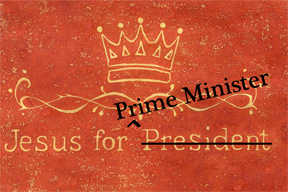by Sylvia Keesmaat
 All the evidence suggests that he knew what was coming. As their steps took them closer and closer to Jerusalem he began to speak of it more and more urgently: he was going to Jerusalem to face torture and death. He was going to lose his life. He was going to walk the path of suffering.
All the evidence suggests that he knew what was coming. As their steps took them closer and closer to Jerusalem he began to speak of it more and more urgently: he was going to Jerusalem to face torture and death. He was going to lose his life. He was going to walk the path of suffering.
All the evidence suggests that the disciples didn’t understand what on earth he was talking about. Right up until the last moment they were asking him if they could share in his rule, share in his glory and power. Right up until the last moment they thought that he would be the one to deal with the problem of the Romans, he would be the one to do battle with their hated oppressors, he would be the one to rid the land of the gentiles who where oppressing and killing the people.
So when he told them to go and find a donkey and a colt for his ride into Jerusalem, they went gladly. This was going to be it, the big splash, the entry into the holy city, where Jesus would let everyone know what he had come to do! Too bad, really, that the only animal they could line up was a donkey. But they were poor and beggars can’t be choosers.
And, of course, the timing was perfect. They were entering Jerusalem right before the Passover festival. You remember the Passover. The festival that celebrated the liberation of the Israelites from Egypt. The festival that reminded the Jewish people that their God was a God who heard their cries and set them free. There was no time more appropriate for Jesus to enter Jerusalem and declare himself king of the Jews than the Passover feast, when nationalist feelings ran high.
Of course, the Romans knew that nationalist feelings ran high during the Passover. That is why the city was crawling with soldiers during the Passover. And Jerusalem became a powder keg. The Jewish people could not hide the hatred they felt for the Romans; all these foreign soldiers, patrolling the streets, walking even in the temple, looking for any pretext to haul people off to prison, looking for any excuse to engage in torture, just waiting for a chance to work off the boredom of being stationed in Jerusalem.
This is Jerusalem at Passover time. And outside this city, at this time, Jesus sent his disciples for a donkey and a colt. And when they returned with the donkey, the disciples spread their cloaks on it. If their leader was going to enter the city on donkey, the least they could do was try to make it look at little more impressive, like a cloth-covered steed for the king. And as the donkey moved forward into the crowd, cloaks and palm branches were spread on the ground before him, as befits a king, and the roar of the crowd rang in Jesus’ ears:
Hosanna to the Son of David!
Blessed is the one who comes in the name of the Lord!
Hosanna in the highest heaven!
Where had those words been heard before? Many years ago the angels had sung to the shepherds in the dark of night: “Glory to God in the highest heaven!” And now their words were echoed by the people lining the road to Jerusalem, Hosanna in the highest heaven, for the child, a saviour, now become a man—who surely will save us! Won’t he?
For Jesus, the question was a real one. All the evidence suggests he knew that he was entering Jerusalem to die. But as he looked at the crowds, at the cloaks and palm branches, as he heard the shouts of praise—shouts of praise for him!—he must have considered his options.
Did the sounds of the crowd cause the adrenalin to run through his blood? Did he think that maybe it didn’t have to be this way? Maybe instead of that path of suffering he should rally this crowd, have the disciples organize them into groups for battle and take on the Romans! The people loved him and would follow. With this much popular support, he had a chance of defeating these despised foreigners, these pagan terrorists, these enemies of God. Perhaps the way to defeat the evil and oppression of the empire was to fight it after all! Could he be sure that the path to death was the way to defeat evil once and for all? What if that was really the coward’s choice? What if he was meant to fight the forces that were killing his people?
We know that right up until his time in the garden Jesus was pondering the question of whether there was another way forward. In the garden he was still praying for another path. But already here he chose not to ride the way of the praises of the crowd. Why not? Perhaps his eyes dropped to the donkey. He was not riding a war horse. He was riding a donkey.
Perhaps he thought also of the story of his people. It is a story of violence, to be sure. But it is also a story with unexpected grace and forgiveness of the enemy.
All the evidence suggests that he knew these stories and knew his path. Not for Jesus the story of empire. Not for Jesus the story of a power which defeats the enemy, enslaves him, tries to wipe him out. Not for him the story of hatred for the other. He knew his end: a crown not of power but of thorns, a throne shaped like a cross, and only forgiveness for the gentiles who had killed him. Since the foundations of the world, he knew that peace had never come through violence. That the only way to defeat the evil of the world, the evil of oppression, the evil in the hearts of us all, was to bear it in suffering love.
In the country where I live, we don’t in an occupied country, under the boots of brutal soldiers, in fear for our lives and the lives of our children. And yet our world isn’t that different from that of first century Judea. We, too, live in a world where the path to peace is promised through the sword. We, too, live in a world where hatred of enemies feeds our hopes. We, too, live in a world where fear and terror make us look for saviours who can ride war horses rather than donkeys.
This coming week we will walk the way of the cross with Jesus. We will see him wash the disciples’ feet; we will see him offer bread and wine for remembrance; we will see him wrestle with God in Gethsemane; we will see him tortured, beaten and killed. We will see him meet evil not with violence but with forgiveness; we will see him overcome hatred with love; we will see him bear evil until it exhausts itself in his body. We will see him die at the hands of terror. And, we will see him rise.
Jesus calls us to make this story our own. He calls us to wash the feet even of our enemies. He calls us to bread and wine in remembrance of his death. He calls us to meet evil with forgiveness and hatred with love. And when we do, perhaps we will find ourselves on the way that leads only to a cross. Perhaps we will find for ourselves a crown that consists only of thorns. Perhaps we will find for ourselves a death that ends the story of violence. Perhaps even we will rise to new life.
